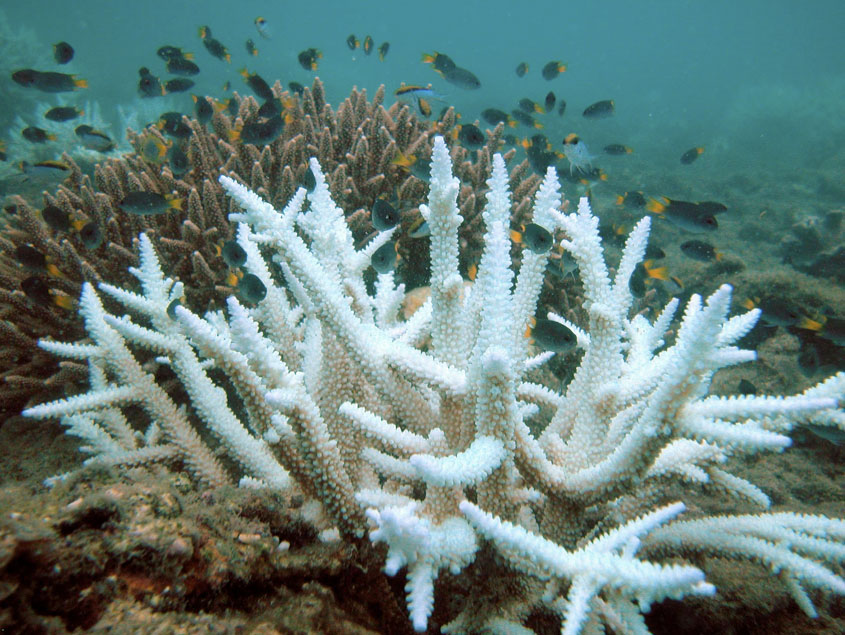Through both Mr. Phillip’s AP English III class and Dr. Stone’s APES class, I have had the opportunity to research and formulate questions concerning the Great Barrier Reef and other reefs around the world.
Last semester, Phillip’s gave my class with a task: write an argumentative essay about something you are passionate about or simply have a curiosity for. Through this assignment, I discovered the devastating fate and current conditions of the Great Barrier Reef off of Queensland, Australia.
The health of coral reefs never struck me before as something people should have concern towards, but it deserves a ton of attention.
The articles and images supplied by top news producers around the world were, and continue to be, jaw dropping. Due to El Niño, an irregular climate change affecting countries lying on or around the equator in the pacific, and other harmful acts committed by mankind, coral reefs are deteriorating. This harms industries and limits the number of sanctuaries available to thousands of species, some endangered.
The death of a reef is a process. Reefs are constantly facing stressors ranging from a change in temperature to not using proper disposal methods when it comes to chemicals. When these stressors continue to pile up, the reef system fails. Death occurs when coral is bleached. Bleaching occurs when coral expels the symbiotic algae, Zooxanthellae, an important component in the photosynthetic processes needed for survival, resulting in the coral turning white– the onset of starvation and immune system failure.
This is devastating. With the recent release of Finding Dory, I find it interesting that this pandemic, coral bleaching, wasn’t one of the messages introduced in the film (or at least hinted at). A movie centralized near Australia, dedicated to depicting sea life as accurate as possible, leaves out something that I, and many others, wouldn’t have learned about without research. It’s sad to think little Nemo will soon be lacking a home.
In AP Environmental Science, more commonly referred to as APES, students have the task of writing legislative letters to anyone in authority, about anything of interest (preferably concerning the environment). I am enrolled in APES currently and was inspired to write a letter to the EPA concerning reef health around the world. APES supplied me with the opportunity to use my knowledge from my English paper and share my concerns on bleaching to someone of importance, someone who could make a difference.
What came as a surprise was… they actually wrote back! The letter was long, showing respect and a willingness to ease my concerns. Grace Robiou, Chief of the Marine Pollution Control Branch at the EPA, wrote, “Despite the significance of the world’s coral reefs, over 70 percent of these ecosystems are threatened by both local and global stressors,” which is what the EPA is fighting to reduce.
Through understanding and addressing problems faced by the reefs, the EPA has the authority to contact and limit human waste created on the land by confronting businesses or homes conducting wasteful habits.
In addition to her efforts through the EPA, Robiou is partnered alongside “11 other federal agencies, seven U.S. States, Territories, Commonwealths, and three Freely Associated States, to lead, coordinate, and strengthen actions across the U.S. Government to protect and preserve coral reef ecosystems” through the U.S. Coral Reef Task Force (USCRTF).
It is not solely the job of government agencies to protect and prevent damage to surrounding ecosystems like reefs, it is the average Joe’s job as well.
“Encouraging environmentally-friendly lifestyle choices within your community, such as conserving water, choosing sustainable seafood, reducing your use of plastic bags, and disposing of waste in a responsible manner, even if you live far way from coral reefs, will help to keep waters clean and pollution free,” wrote Robiou.
“It isn’t too late to protect and sustainably manage these fragile yet resilient ecosystem,” said Robiou. “The good news is that some reefs off of our coasts and around the world have shown to be remarkably resilient, [supporting Robiou’s previous claim], and have recovered from bleaching.”
Hopefully all reefs around the world make a miraculous recovery.
For more information, feel free to visit the website I had to create along side my argumentative essay in English.

Leave a Reply